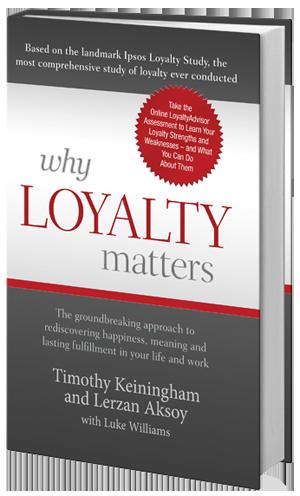A few weeks ago, I ran across the work of a company called Ipsos. Ipsos is a global survey-based market research company out of France. Their slogan as a company is “Nobody is Unpredictable.” They predict human behavior for companies who want to primarily improve their advertising and marketing efforts. 
At some point, this company figured out that the topic of loyalty is a major factor in how a company’s customers and employees experience a sense of well-being and satisfaction. The data was so strong that the company set up a subsidiary called Ipsos Loyality that focuses fully on the subject of loyalty and the impact it has on a company’s customers and employees.
Doesn’t this seem odd? In many parts of our society, loyalty is not considered a virtue anymore. Companies that are struggling to stay in business are often forced to undergo a lay-off period…often more than one round. Employees who are affected by a lay-off or see their peers experience this type of misfortune often have a tough time mustering any legitimate feelings of loyalty towards their employer.
How about customers? Does it really make sense for a person to be loyal to a certain company when global competition drives prices down to the point where you can get near identical products and services from multiple companies? At that point, doesn’t it make sense to be “loyal” to the company that can get you what you want at the lowest possible price? Costco has built a multi-billion dollar company on this principle.
And it’s not just business… This lack of loyalty has seeped into nearly every facet of our lives. It has become an anachronism of a value system that has gone by the wayside. It has even got to the point where some would consider loyalty to be a character flaw. For example, when former President Carter wanted to insult the British Prime Minister, Tony Blair’s, support of President Bush, he called him “Abominable. Loyal. Blind. Apparently subservient.”
If loyalty is now such a negative trait, you might wonder why I’d take time to discuss it. The reason for doing so is outlined in "Why Loyalty Matters," a recent book written by Timothy Keiningham and Lerzan Aksoy. In this book, the authors draw upon research conducted by Ipsos Loyalty and demonstrate how loyalty is a necessary ingredient to happiness, meaning, and lasting fulfillment in both your work and your personal life.
In the next few WorkPuzzle blogs, we’ll discuss some of the principles outlined in this book. I think it will challenge your thinking. The basic premise is this:
“Fulfillment only comes when we give of ourselves to others. Loyalty, like love, is not something you get but something you give. But, like love, giving loyalty, over time, through difficulties and trials, leads to mutual loyalty. And it leads to relationships that are a profound source of satisfaction and happiness that cannot be built in any other way.”
I think you’ll see that this principle will impact not only your company’s performance, but your personal relationships as well.
Editor's Note: This article was written by Ben Hess. Ben is the Founding Partner and Managing Director of Tidemark, Inc. and a regular contributor to WorkPuzzle. Comments or questions are welcome. If you're an email subscriber, reply to this WorkPuzzle email. If you read the blog directly from the web, you can click the "comments" link below.

